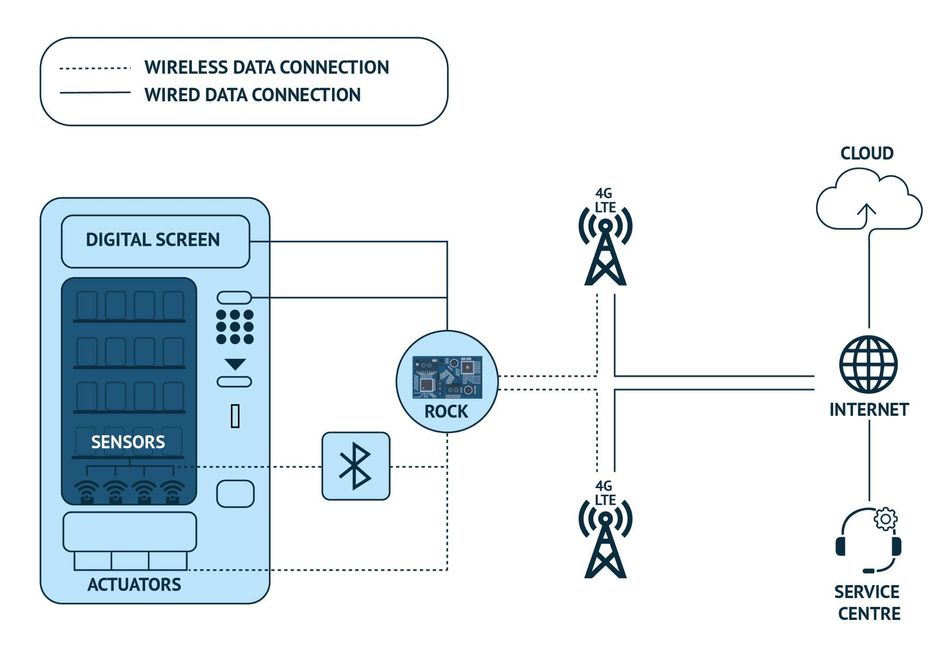Building Internet-Connected Smart Vending Machines With Powerful Single Board Computers
Smart vending machines powered by high-performance single-board computers can significantly improve customer experience and boost sales with features such as real-time stock monitoring, digital payments, voice/gesture control, and more.
The growing adoption of digital technologies and IoT is revolutionising shopping experiences. From massive online marketplaces to retail outlets and malls, businesses are leveraging connected devices and intelligent automation for making shopping more accessible and intuitive by having stores and vending machines open 24 hours a day and by using AI to understand and learn user behaviour.
This case study explores how vending machines can be automated with Single Board Computers (SBC) to offer features like digital payments, contactless ordering, intuitive UI, real-time stock monitoring, and stock management. We use the Rock line of SBCs by OKdo and Radxa as an example in the study.
Increasing Demand for Self-Service Technologies
Self-service technologies refer to the interfaces allowing customers to purchase a product or use a service without direct interaction with the providers. Vending machines, kiosks, and ATMs are all examples of self-service technologies.[1] Over the last couple of years, there has been a surge in demand for these technologies. Recent market research reports have suggested the self-service technology industry is expected to grow at a compound annual growth rate of 11.27% over the next couple of years to reach a valuation of around $72.50 bn by 2030.[2]
This surge in demand is largely driven by increased consciousness of hygiene in the post-pandemic era, the consumer demand to purchase products outside traditional shopping hours and its expansion activities that led to more people passing through transport hubs as part of their commute.
Vending machines are the most commonly available self-service technology. They have a simple purpose: to give out items from their stock in exchange for money or tokens.
Using vending machines is a straightforward task for customers. However, maintaining them involves a lot of manual work, which incurs substantial operating costs for vending machine owners. Businesses are looking for smart industrial vending solutions to help them optimise their operations by using sales metrics, smart stocking schedules and predictive or active maintenance.
The Rise of Smart Vending Machines
Smart vending machines are evolved forms of vending machines that offer features such as digital payments, contactless ordering, fast transactions, intuitive UI, and real-time stock monitoring. With all these cutting-edge features, smart vending machines can attract new as well as repeat customers. These IoT-enabled self-service solutions boost sales and help businesses stay updated with the latest data.
Businesses that run vending machines try to reduce costs and increase profits by finding new ways to optimise the maintenance of their vending machines, opting for industrial automation and control for IoT-connected smart vending machines.
Automating Vending Machines with SBCs
Smart vending machines include different elements to facilitate their normal activities, such as sensors for temperature, humidity and stock levels control, digital screens for advertising, and a terminal for contactless electronic payments.
A basic 8-bit/16-bit or even a 32-bit microcontroller doesn’t pack enough features or the processing power required to interface the different modules and carry on operations required for the smooth functioning of smart vending machines. The maximum memory addressed by even a 32-bit microcontroller is just 4 GB which is too less for today’s applications. The processing power too, won’t be enough to handle smart vending machines that use Artificial Intelligence (AI) and analytics to analyse device and customer data to deliver meaningful insights. The basic controllers also won’t be sufficient to offer features like touchscreen displays, fast and attractive User Interface (UI), high-speed connectivity, and more.
An SBC is a highly integrated computer built entirely on a single PCB. Everything required to run the computer, including the CPU, GPU, memory, IO ports, connectivity modules etc. are all a part of the same PCB. Design engineers can directly take such a system and integrate it with their application to quickly build products.
SBCs gained popularity around ten years ago with the introduction of the Raspberry Pi. Since then, we’ve seen more brands come up with their own versions of these devices having new features and better specifications. Today, these devices pack sufficient features to serve as the brains of smart vending machines and many other smart IoT products used in the domestic and industrial space.
Smart vending machines based on SBCs can be monitored remotely, enabling notifications and alerts about the present state of the system that can be used to detect unexpected breakdowns or faults well in advance. What’s more, the SBCs also serve as gateways to the service centres, allowing them to monitor stock levels inside the vending machine and inform decisions for refilling the machine.
Apart from its powerful System on Chip (SoC), extensive storage capacity, integrated real-time-clock, and advanced multimedia capabilities, all supporting the vending machine to run seamlessly, SBCs provide multiple connectivity capabilities, including Bluetooth 5.0, WiFi 6, gigabit ethernet, inbuilt antenna, USB and display peripherals, allowing you to incorporate them into your vending machine and optimise its performance and maintenance.
Benefits of Using SBCs for Smart Vending Machines
SBCs, with their rich set of processing and connectivity features, unlock immense possibilities for building smart vending machines. Here are some features of smart vending machines powered by SBCs that set them apart from traditional ones:
- Connection reliability for the overall operation of the smart vending machine – Staying connected to the internet is the most basic requirement for enabling the smart features of vending machines. The SBCs benefit from extensive connectivity capabilities, including Bluetooth 5.0, WiFi, Gigabit Ethernet, USB and HDMI ports, and an antenna.
- More ways to control – Smart vending machines come with touchscreen displays, capacitive touch pads, voice recognition, gesture recognition and more to let users place orders more intuitively.
- Digital payments – Unlike traditional vending machines that only accept cash, smart vending machines are fitted with card terminals that let users simply tap their credit cards to pay for their orders. These machines also handle failed transactions well by automatically (and immediately) refunding the users in case of an issue.
- Accurate temperature and humidity control – To keep consumables and fast-moving consumer goods (FMCG) products fresh, smart vending machines need to run a closed-loop system for maintaining accurate temperature and humidity. Some SBCs such as the ROCK line by OKdo and Radxa come with onboard Analog-to-Digital Converters (ADC) and General Purpose Input Output (GPIO) extension headers that make them widely compatible with a wide range of devices, including sensors that will facilitate measuring and controlling the temperature and humidity levels to ensure the required storage conditions are met.
- Real-time inventory management – Inventory management is a task that requires maximum human intervention. Staff members are sent to manually check and refill the stock of traditional vending machines at fixed intervals. On the other hand, smart vending machines are equipped with SBCs having onboard real-time clocks, camera ports and extensive storage capacity, including an ample amount of RAM and a high-speed eMMC socket for eMMC modules that can be used for OS and data storage. Sensors keep track of the stock in real-time (and predict in advance) when refilling would be required. The vending machine can trigger alerts when the stock needs to be refilled. This way, it can be ensured that the vending machines are never empty, and sales never halt.
- AI-driven decisions – Dead stock is detrimental for vending machine owners as it generates no income and still takes up space. AI-based programs can be deployed on SBCs powering smart vending machines to price stock dynamically such that the products that are nearest to the expiry date (or are lying unsold for too long) are offered at a cheaper rate. This would reduce wastage and provide feedback to vending machine owners about the preference of customers.
- High-quality video and audio streaming – SBCs like the Rock 5 Model B by OKdo and Radxa are fitted with Arm Mali™ G610MC4 GPU, camera, display interfaces, dual-display support of up to 4K60 resolution, and high-quality stereo audio output. Smart vending machines using such SBCs can display advertisements and generate extra revenue.
Rock: The Smart Vending Machine Solution
Maintaining accurate temperature/humidity, monitoring the stock in real-time, establishing a reliable connection to the cloud, and streaming high-quality content are just some examples of tasks that microcontrollers and entry-level SBCs can not handle. To solve this challenge, engineers must integrate high-performance SBCs such as the Rock by OKdo and Radxa.
SBCs from the Rock series improve over the existing ones by including a whole lot of new features that help design engineers quickly build prototypes and turn them into successful products. Here are some of the key features of Rock 5 Model B SBC by OKdo and Radxa:
- Based on the powerful Rockchip RK3588 SoC
- A dedicated Neural Processing Unit (NPU) with all necessary control and arithmetic logic to execute machine learning (ML) algorithms
- Arm® DynamIQ™ Quad Cortex® A76, Quad Cortex® A55 CPU, and Arm Mali™ G610MC4 GPU
- 8GB 64-bit RAM and eMMC socket
- 2.5Gbps ethernet connector for high-speed data transfer at low latencies
- Power on/off button for performing quick, easy, and safe shutdowns without the risk of corrupting storage
- The first SBC supporting up to 8K60FPS resolution tailor-made for advanced multimedia applications
- Built-in Real-Time-Clock, Dual HDMI and USB C port
- Micro-HDMI input port supporting input of up to 4K60FPS resolution
- Easy interfacing with other hardware modules
If you’re looking for the best industrial vending machine solution, get in touch with the OKdo Solutions and Services team. OKdo helps solve complex industrial problems and identify new optimisation and development opportunities.
The Rock Engineering Challenge
We invite engineers, entrepreneurs, inventors, and developers to submit an idea for a part, product, or system that takes advantage of the ROCK single-board computers.
- The first 500 valid entries will receive a ROCK board of choice worth $45 - $159.
Simply tell us what you are working on, and we'll send you a piece of cutting-edge hardware to bring your ideas to life. - The most-cutting edge entry will be rewarded with a grand prize of a $50,000 partnership with electronics company OKdo to scale up their project idea.
The challenge is now open until April 12th, 2023.
Read more on the challenge homepage!
About the Sponsor: OKdo
OKdo is a brand delivering a unique combination of hardware, software, development, and manufacturing services to help customers turn their innovative ideas into commercial realities. The company has been endorsed by technology giants such as Arm, NXP, Broadcom, Intel, and SEEED. OKdo partners with different brands to bring the latest and most innovative IoT and SBC products to people around the world.
References
[1] Self-service Technology Market Size, Share & Trends Analysis Report By Product, Grand View Research, [Online], Available from: https://www.grandviewresearch.com/industry-analysis/self-service-technology-market
[2] Intelligent Vending Machine Market Statistics and Industry Analysis Detailed in Latest Research Study and Analysis Report 2022-2030, Market Watch, 21 Sept. 2022, [Online], Available from: https://www.marketwatch.com/press-release/intelligent-vending-machine-market-statistics-and-industry-analysis-detailed-in-latest-research-study-and-analysis-report-2022-2030-2022-09-21





